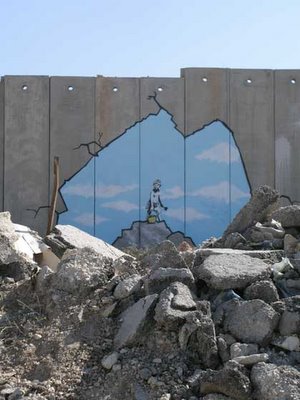A little land of terrorists?

Hamas recently won the election in Palestine – some say by a landslide. Many agencies worldwide, in their coverage of the matter, are describing Hamas as a terrorist organisation. Nobody, though, seems to be questioning the election result. It’s generally accepted that Hamas has been democratically elected by a large proportion of the population of Palestine. The reasons for their choosing of Hamas are undoubtedly complex. Frustration with the perceived ineffectiveness of the long-ruling Fatah party, a sense of connection with Hamas’ work to alleviate poverty, and views about the role of Islam in political life are undoubtedly factors.
Western countries, and the US in particular, have been pushing the cause of democracy in the Middle East. The issue of democracy bringing about a religious state – particularly an Islamic state, which sits uncomfortably with the very idea of democracy since Islam, like Christianity in the minds of many, considers morality and the politics upon which it is based as handed down by God and thus timeless – is not a new one, and it hasn’t always been thoughtfully dealt with by democracy advocates.
Of course religious states can be democratic – Israel itself is an example, and Iran another. Iraq might well turn out to be another. The other important point being made by many analysts is that political power changes organisations such as Hamas and renders them necessarily more pragmatic.
I suspect that the international community, not wishing to abandon the Palestinian cause, will in turn temper its characterisation of Hamas as a terrorist organisation. This will be most difficult for this particular US administration, with its full-blown anti-terrorist rhetoric.
Deeper questions need to be asked, however. This article from the New York Times indicates that the choice of Hamas by the Palestinian people can’t simply be dismissed as an ill-informed, short-term reaction driven by frustration with the perceived corruption and inanition of Fatah. It seems that a people who have suffered many indignities have only been made more stubborn and defiant. You would think this could’ve been predicted, but world leaders, and Israeli leaders in particular, have tended to blame the Palestinian leadership – especially during the time of Arafat – for all the trouble-making, accusing them of incitement and intransigence, while remaining largely silent about the role of and the views and wishes of the bulk of the Palestinian people. If you wish to call Hamas a terrorist organisation, and you accept that the majority of Palestinians support Hamas, knowing full well their international reputation, then you can hardly avoid describing the majority of Palestinians as terrorists. If you feel uncomfortable with this formulation, and surely most people do, then maybe it’s time to rethink the situation.
Labels: politics


0 Comments:
Post a Comment
Subscribe to Post Comments [Atom]
<< Home